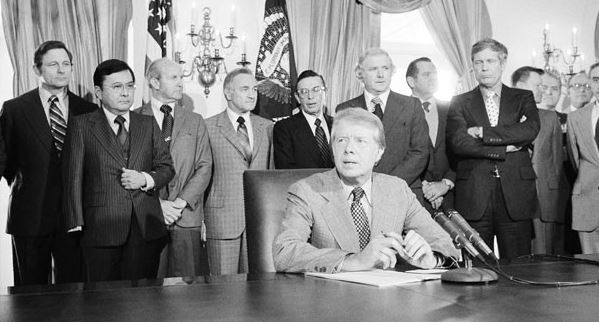During his time in office from 1977-1980, the late president Jimmy Carter made significant contributions to the Asian American community and diplomatic efforts with Asian nations.
His death this past week at the age of 100 has sparked a renewed recognition of his accomplishments.
With pressure from lawmakers, including Rep. Frank Horton, Sen. Daniel Inouye, Rep. Norman Mineta, and others, Carter signed the resolution in October 1978, declaring the seven-day period beginning May 4, 1979, as Asian Pacific American Heritage Week. This marked the first time in the nation’s history that a racial group had been celebrated nationally. In 1992, Congress extended the observance to a month celebrated annually.
“We have not always fully appreciated the talents and the contributions which Asian Americans have brought to the United States…. Yet, Asians of diverse origins—from China, Japan, Korea, the Philippines, and Southeast Asia—continued to look to America as a land of hope, opportunity, and freedom,” Carter issued in Proclamation No. 4650.
“… Their successful integration into American society and their positive and active participation in our national life demonstrates the soundness of America’s policy of continued openness to peoples from Asia and the Pacific,” Carter stated.
Madalene Mielke, president and CEO of the Asian Pacific American Institute for Congressional Studies, describes the proclamation as a display of solidarity to NBC. “This type of recognition is a part of understanding that we are not blending into society; we are also becoming, changing what society looks like and what is deemed American,” Mielke expresses.
In the years after World War II, Japanese Americans initiated redress movements for justice regarding the mass incarceration of 120,000 citizens and permanent residents of Japanese descent in the United States.
In 1979, Sen. Inouye and Spark Matsunaga, both Democrats from Hawaii, introduced Senate Bill 1647, establishing the Commission on Wartime Relocation and Internment of Civilians. President Carter signed the bill that established that committee and eventually lead to reparations and a public apology for Japanese American wartime survivors in 1988.
In China, Carter is primarily recognized for forging diplomatic ties with Beijing, even being called “an old friend of the Chinese people” by Jiang Zemin, a former president of China.
On Dec. 15, 1978, following months of undisclosed negotiations, the United States and the People’s Republic of China declared formal recognition of one another, establishing sanctioned diplomatic relations. This ended decades of hostility – at the expense of the United States retracting its diplomatic recognition of Taiwan, repercussions which are still being felt today.
Beijing extended condolences on Dec. 30 and saluted him as a “key promoter and decision-maker” in establishing relations. On Chinese social media, many users referred to him as the “good old man.”
His legacy in Taiwan, however, is more complicated. Taipei’s leaders criticized his abrupt announcement to rupture diplomacy with Taipei and demanded an apology. Carter declined, insisting his decision had been correct.
AsAmNews is published by the non-profit, Asian American Media Inc.
We are supported through donations and such charitable organizations as the Robert Wood Johnson Foundation. A big thank you to all our readers who supported our year-end giving campaign. You helped us not only reach our goal, you busted through it. Donations to Asian American Media Inc and AsAmNews are tax-deductible. It’s never too late to give.
Please also follow us on Instagram, TikTok, Facebook, YouTube and X.

